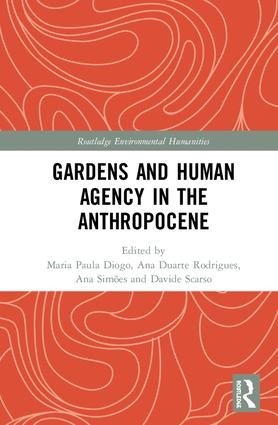Gardens and Human Agency in the Anthropocene
- Autoria
Maria Paula Diogo, Ana Duarte Rodrigues, Ana Simões, Davide Scarso (eds.)
- Edição
- Routledge
- Ano
- 2019
- Nº de Páginas
- 238
- ISBN
- 9780815346661

About this book
This volume discusses gardens as designed landscapes of mediation between nature and culture, embodying different levels of human control over wilderness, defining specific rules for this confrontation and staging different forms of human dominance.
The contributing authors focus on ways of rethinking the garden and its role in contemporary society, using it as a crossover platform between nature, science and technology. Drawing upon their diverse fields of research, including History of Science and Technology, Environmental Studies, Gardens and Landscape Studies, Urban Studies, and Visual and Artistic Studies, the authors unveil various entanglements woven in the past between nature and culture, and probe the potential of alternative epistemologies to escape the predicament of fatalistic dystopias that often revolve around the Anthropocene debate.
This book will be of great interest to those studying environmental and landscape history, the history of science and technology, historical geography, and the environmental humanities.
This volume discusses gardens as designed landscapes of mediation between nature and culture, embodying different levels of human control over wilderness, defining specific rules for this confrontation and staging different forms of human dominance.
The contributing authors focus on ways of rethinking the garden and its role in contemporary society, using it as a crossover platform between nature, science and technology. Drawing upon their diverse fields of research, including History of Science and Technology, Environmental Studies, Gardens and Landscape Studies, Urban Studies, and Visual and Artistic Studies, the authors unveil various entanglements woven in the past between nature and culture, and probe the potential of alternative epistemologies to escape the predicament of fatalistic dystopias that often revolve around the Anthropocene debate.
This book will be of great interest to those studying environmental and landscape history, the history of science and technology, historical geography, and the environmental humanities.
Table of contents
- Introduction
- Aline de Figueirôa Silva, Hygiene, Education and Art: Roberto Burle Marx’s 1930s Modern Gardens in Brazil
- Vanessa Cirkel-Bartelt, Between the Nuclear Lab and the Backyard: Artificially Enhanced Plant-Breeding and the British Atomic Gardening Movement
- Ana Simões, Maria Paula Diogo, Urban utopias and the Anthropocene
- Ana Cristina Roque, Shaping Colonial Landscapes in the early 20th century: Urban Planning and Health Policies in Lourenço Marques
- Ana Duarte Rodrigues, From Pairidaeza to Planet Garden: The homo-gardinus against Desertification
- Astrid Schwarz, From Homo Faber to Homo Hortensis: Gardening Techniques in the Anthropocene
- Nina Wormbs and Johan Gärdebo, The Distant Gardener: Remote Sensing of the Planetary Potager
- Davide Scarso, Resistance in the Garden: Nature and Society in the Anthropocene
- Nina Möllers, Luke Keogh, and Helmuth Trischler, A New Machine in the Garden? Staging Technospheres in the Anthropocene
- Jaume Valentines-Álvarez, Eric LoPresti, The Atom in the Garden and the Apocalyptic Fungi: a Tale on a Global Nuclearscape (with artworks and bird-songs)
- Mariana Silva, Pedro Neves Marques, Inhabitants: Image Politics in ongoing Climate Crisis
- Ivo Louro, Ana Matilde Sousa, Troubled Gardens: Nature-technoculture binary and the search for a Safe Operating Space in Hayao Miyazaki’s Mononoke Hime